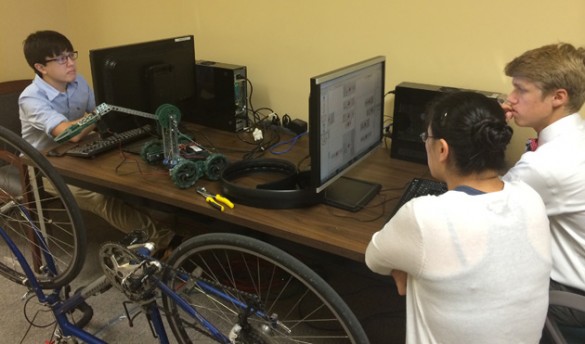Metropolitan Nashville Public Schools has joined with the Vanderbilt Center for Nashville Studies and Peabody College to create a platform to provide detailed, reliable and recurring information about the commitment of major employers to the public school system. This is the latest installment in a series that tells the story of collaborative involvement between members of the Vanderbilt community and local public schools.

Thirteen Nashville public high school students are spending their summer mornings on the Vanderbilt campus building bicycle models using software tools developed to revolutionize the manufacturing of military vehicles.
The internship project, now in its second year, is facilitated by Brandon Knight and his brother, Justin. Program coordinators for separate projects at Vanderbilt’s Institute for Software Integrated Systems (ISIS), the siblings created a bike shop while growing up in Hartford, Connecticut. They quickly realized tools created at Vanderbilt could be used to excite teen-agers about computer modelling concepts.
Before joining the ISIS team, Brandon Knight taught science at Eagle Rock School and Professional Development Center in Estes Park, Colorado, and worked for a nonprofit on drop-out prevention. He brought that passion for education to his current job at Vanderbilt.
Under Brandon’s guidance, the interns are working in teams using modeling tools to develop new concepts, much like the engineers who developed the new suite of software as part of a large-scale effort to democratize the vehicle design process and significantly cut design time. The software, which ISIS created for the Defense Advanced Research Project Agency, is open source, meaning it is available for free.
The software tools were developed as part of the Automated Vehicle Make (AVM) project in an ambitious effort to totally revamp the way the Department of Defense supplies vehicles to the nation’s troops. Sandeep Neema and Ted Bapty, senior research scientists at ISIS, are principal investigators. Both are also research associate professors of electrical engineering and computer science at Vanderbilt.
“While these tools are designed to help build large, complex cyber-physical systems, they also work for smaller-scale projects,” Bapty said. “[rquote]By having the students use them to invent bike gadgets, we get valuable feedback on how designers at all levels use the tools.”[/rquote]
AVM has an educational component that includes an undergraduate design competition, during which student participants from Vanderbilt worked in a School of Engineering lab with Tom Withrow, assistant professor of the practice of mechanical engineering. Withrow provided input for the start of the summer high school program as well.
The 13 interns hail from Hume-Fogg, Martin Luther King and Stratford high schools in Nashville. The part-time internships are unpaid this summer, but Knight said he hopes to seek possible funding sources.
The ultimate goal of the internship, now in its second year, is to encourage a growing pool of high-tech talent in Nashville that would ultimately attract industry to the area and plant the seeds for young entrepreneurs interested in start-ups.
“We need to re-capture the imagination of the best high school students early on with the excitement and beauty of engineering design,” said ISIS Director Janos Sztipanovits, E. Bronson Ingram Professor of Engineering. ”What could be a better way for this than turning them into makers, challenging them with creating new things and empowering them with engineering tools that help them to freely innovate?”
Founded in 1998 with just 10 researchers, ISIS now has a cadre of more than 180 faculty, staff, students and interns involved in more than 60 active projects. ISIS is a key national player in an effort to design the software-integrated systems that have become an integral part of human lives today – in consumer appliances, vehicles, planes, hospitals, schools, design shops, factories, space systems and energy.
Contact Brandon Knight at bknight@isis.vanderbilt.edu for more information about the internship program, including details about a planned presentation of the interns’ projects on Aug. 1.
Add immunizations to summer to-do list
Take time this summer to make sure your school-age children have a healthy year by scheduling required immunizations.
Tennessee students entering seventh grade must provide their schools updated Tennessee Immunization Certificates with proof of two additional immunizations:
- Tetanus-diphtheria-pertussis booster (Tdap); and
- Verification of immunity to varicella — two doses of the vaccine or history of having chicken pox.
Children enrolling in a Tennessee school for the first time—pre-K, kindergarten or transferring from out of state—also must provide their current immunization records on a Tennessee Immunization Certificate to their schools.
By Tennessee law, parents must provide the updated Tennessee certificate to the school; an out-of-state record won’t do.
Immunizations are available through private health providers or the Metro Public Health Department. For more information, visit http://www.nashville.gov/Health-Department/School-Health/School-Health-Immunizations.aspx.
In Metro Nashville, school starts Wednesday, Aug. 6.